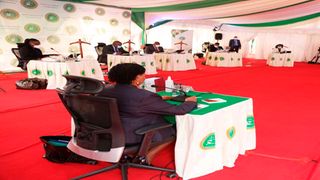
Court of Appeal Judge Martha Koome is interview by the Judicial Service Commission for the Chief Justice position, at the Supreme Court buildings in Nairobi on April 14, 2021.
| Jeff Angote | Nation Media GroupNews
Premium
The week that was at Chief Justice interviews
As they took their seats to state their cases on why they should be considered for the vacant position of Chief Justice, all the five candidates so far interviewed spelt out their dreams for the judiciary.
Their bright and polished ideas have been on the back burner for all those years. But what appeared to trip all the five applicants was their past records, wealth declaration and tax issues.
The Judicial Service Commission (JSC) began the interviews on Monday chaired by interim vice-chairperson of the commission, Prof Olive Mugenda. So far, Justice Said Juma Chitembwe, Prof Patricia Kameri-Mbote, Justice Martha Koome, Justice Njagi Marete, and Senior Counsel Philip Murgor have been before the panel.
In the second week of the interviews, Justice Mathews Nderi Nduma will be facing the panel on Monday, followed by Fredrick Ngatia on Tuesday, Justice William Ouko on Wednesday, Prof Moni Wekesa on Thursday and Ms Alice Yano will wrap up the two-week interviews on Friday.
Living true to Justice David Majanja’s “a man is his history” quip, the Chief Justice hopefuls have had to respond to uncomfortable questions about their past actions and statements.
Justice Chitembwe, for instance, was hard-pressed to explain his 2016 decision involving alleged defilement of a 13-year-old girl. The judge then held that it was wrong to hand the man a 20-year sentence when both were enjoying the relationship. The decision drew global attention and earned him the Golden Bludgeon (a court ruling with a negative effect on women and girls' lives) in Spain by Women’s Link Worldwide.
During the interview, Justice Majanja, who is a JSC commissioner, said the issue with the decision was not about the logic but rather the way the judge communicated. In response, Justice Chitembwe defended the decision saying that people will always complain. “I believe I used very polite words and I was picking from what the complainant said,” he said.
For Prof Kameri-Mbote, she had to contend with uncomfortable questions about her management style, and allegations of plagiarism. For Justice Koome, the night sitting of the Court of Appeal on the eve of the repeat presidential election in October 2017 to reverse Justice George Odunga’s finding on the appointment of returning officers for the election proved to be a tough climb for her.
Ironically, among the JSC commissioners interviewing her was the Attorney General Kihara Kariuki, who at the time was the president of the Court of Appeal. Mr Kariuki is the one who set up the bench that overturned the Odunga decision without the authority of the Chief Justice to sit on a public holiday and beyond the working hours.
Justice Marete also had his uncomfortable moments. For him, it was mostly regarding the manner he kept referring to an earlier judgement that had been given in his favour when he sued his former employer, the Teachers Service Commission (TSC). Besides, he had to contend with complaints of high-handedness when dealing with staff of the Judiciary.
In the case of Mr Murgor, the Mwakenya ghosts came back to haunt him. As a State prosecutor, he was tasked with prosecuting a Mwakenya Movement alleged architect George Anyona and others on the strength of controversial confessions obtained through torture.
"I prosecuted a case. I was a professional, I was working in the State Law Office," Mr Murgor told the interview panel. It was at that moment that Justice Majanja quipped that “a man is his history; we will judge you accordingly.”
Meanwhile, submitting a duly filled wealth declaration forms (Form JSC 2b) was one of the mandatory requirements for the hopefuls.
Alongside that, candidates needed to obtain clearances from relevant government agencies, the Kenya Revenue Authority (KRA) being one of them.
So far, all the five candidates have failed in one way or the other in meeting this requirement under the Public Officer Ethics Act, 2003.
Missing and incomplete wealth declaration forms, financial statements of spouse and dependents, assets listed in some declarations forms and missing in others, missing bank accounts of the candidates and failure to get clearance from KRA have emerged at the interviews and affects all the candidates.
In Justice Chitembwe’s case, he only filed wealth declaration forms for the last two years, while the interviewers had asked for disclosures dating back three years. The same also happened in the case of Justice Koome, a situation she blamed on “oversight”.
All the candidates who have so far appeared before the interview panel did not list any bank accounts among their assets while Justice Marete excluded stating his salary in the space provided for income, telling the JSC that his understanding of ‘income’ is that it is something above his salary.
“I know my salary is public knowledge. My conception of income was anything apart from salary,” said Justice Marete.
On financial statements of spouses, save for Mr Murgor, all the rest did not file theirs.
Requirement for KRA clearances equally turned out to be a hurdle for the CJ hopefuls. According to Mr Murgor, KRA has been using the candidates’ search for clearances to blackmail them into paying fictitious claims.
For Justice Chitembwe request for clearance from KRA turned out to be a boon for the taxman as it discovered that the judge had been non-compliant in tax payment and filing of returns. Electricity meters in his name led KRA to his rental properties for which he had not been paying taxes. KRA fined him Sh500,000 which the judge said he had paid.





